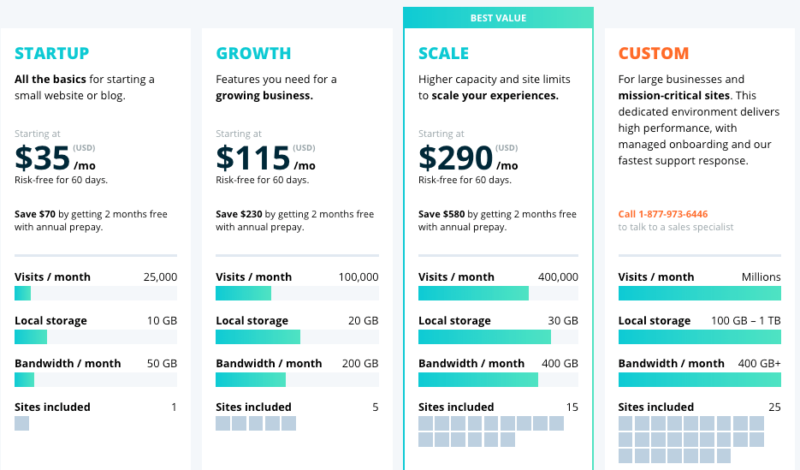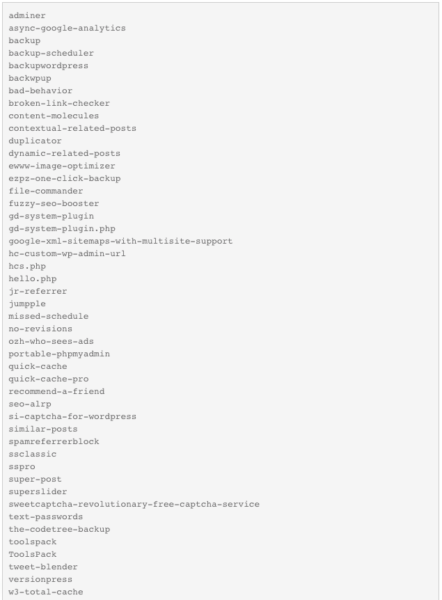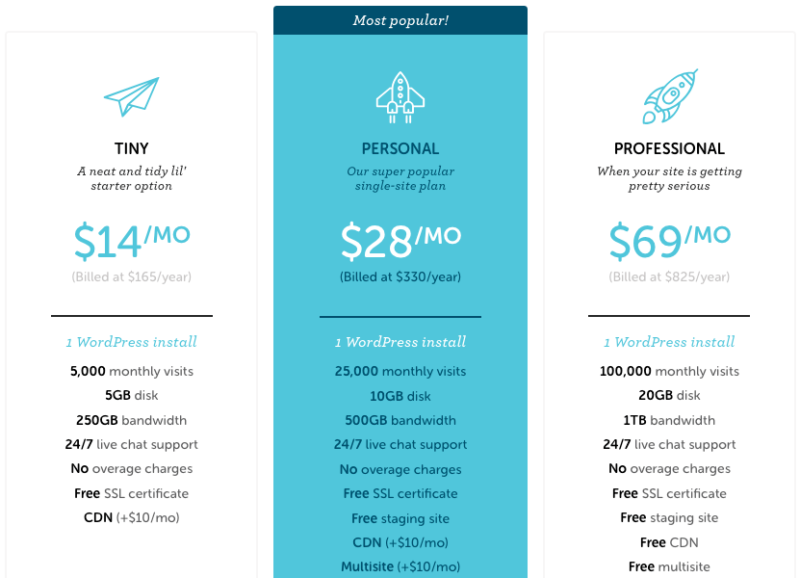Pretty much every single web host out there can run WordPress, and run it just fine. But the very best web hosting for WordPress will be from a fully managed WordPress host.
“Managed WordPress” means the infrastructure your site is hosted on was tailor-made for WordPress, and everyone working behind the scenes has WordPress expertise. As a result, your website will be significantly faster, more stable, and more secure than on a typical shared hosting plan. Customer support will be more knowledgeable and more nuanced. And, a lot of the technical aspects of keeping your website up and running is done for you — no web admin know-how necessary.
The best out there is WP Engine.
5 Best Managed WordPress Hosts
- WP Engine – Quick Sprout Pick
- Flywheel – Runner-Up for Small Websites
- Kinsta
- Pressable
- Liquid Web
Managed WordPress hosting is significantly more expensive than shared web hosting — we’re talking $30–100/month versus $4–15. It’s designed to deliver superior performance to WordPress sites, no matter how big or complex or heavily trafficked. And because a lot of the backend site and server maintenance is done by the host, it delivers superior support to those sites’ owners, too. For businesses that can’t afford any glitches or downtime, and people who don’t have the resources to update, tinker with, and troubleshoot their sites, the price is absolutely worth it.
Small, less complex, and low-traffic sites would absolutely still enjoy the benefits of managed WordPress hosting — just like someone who needs a couple of stitches for a cut on their finger would absolutely still enjoy the benefits of an elite plastic surgeon. But if your site is just starting out, or your traffic is small enough that no one’s really going to notice a few minutes of downtime here and there, a great shared hosting provider will be more cost effective initially.
In fact, two of our favorite hosts, SiteGround and Dreamhost, have a few managed WordPress benefits built right into their basic shared hosting packages, including automatic core updates and daily backups. If the higher price tag for a fully managed WordPress host doesn’t fit into the budget, and you don’t mind a couple of hours a month dedicated to site maintenance, we recommend starting there. You can always transfer your site to a managed WordPress host in the future.
Our Picks for Best WordPress Hosting
WP Engine Quick Sprout Pick
WP Engine is the biggest name in WordPress hosting — when most people think of managed WordPress, they think WP Engine. It deserves its reputation. It’s often compared to a boutique 5-star hotel: its services are unique, elegant, and comprehensive.
If you look at the features that are included with WP Engine’s plans, you may be surprised at the price tag. For $30/month, you can host one 10GB site with a limit of 25,000 monthly visitors. The next tier of service is a hefty $115/month for five sites and 100,000 monthly visitors. (And those prices don’t take into account overage fees if, say, a blog post goes viral or a PR push hits it big.) You can blow through those stats on most shared hosting plans for under $10/month — and get email hosting and a domain name bundled in.

Above, WP Engine’s plans are more expensive than a shared hosting provider — but the quality of service is worth it. Below, a partial list of WP Engine’s banned plugins.

But features are not what managed WordPress hosting is about. You’re paying for service, and service is where WP Engine shines. As a managed host, it maintains speed and security at the server level — meaning you don’t have to do anything at the site level. You don’t have to research and rely on plug-ins to shave seconds off your load time, or become an expert on the best practices for building a lean site. You don’t have to carve out time to update your install and plugins, or run backups, or implement security features to ward off brute force attacks. WP Engine takes care of it all behind the scenes. If we use our hotel analogy, WP Engine does your dry cleaning and serves you three meals a day (plus snacks!) without you even having to call down to the front desk.
Customer service is also excellent, with 24/7 chat support for all tiers of service, and 24/7 phone support starting at the second tier. Its ticketing system is trackable, and its knowledge base is one of the best. And because support is an expert at one thing only — WordPress — the answers you get from human interactions tend to be nuanced and comprehensive.
For many developers and site owners, the biggest surprise with WP Engine is its exclusion of certain plugins and scripts — as in there is a list of both that will not run if your site is hosted on WP Engine. Plugin and script uniformity is how WP Engine maintains excellence, sort of like how a Michelin three-star restaurant has a much smaller menu than, say, a Cheesecake Factory. But, if your site wants to experiment with a plugin on the list, or already relies on one of those plugins, you’re out of luck.
Flywheel Runner-Up for Smaller Sites
If WP Engine is a boutique 5-star hotel, Flywheel is its hip younger sister. This isn’t to say WP Engine is stodgy. But Flywheel is newer to the scene, with a slicker, more user-friendly interface, and it has carved out a niche providing exceptional service to smaller-scale customers, as well as multi-client freelance designers and design agencies.
Compared to WP Engine, Flywheel has a significantly lower price for entry. Flywheel’s plans are divvied up by number of sites — three plans for a single sites, and another three plans for multiple sites (with a customizable enterprise option thrown in) — which gives even little starter sites a chance to get in on the fully managed WordPress game without having to pay for more than they need. Flywheel offers a single site plan with 5,000 monthly visitors and 5GB of disk space for $15/month. That’s half of WP Engine’s lowest tier.

If you’re hosting a single website, Flywheel’s price of entry is very low — but you don’t get all the perks.
Its services targeted to freelance designers and agencies building sites for clients help it really stand out. Little nice-to-haves, like “blueprints” for the themes and plugins you use time after time, and 14 days on a free, password-protected demo site to show your work before having to pay, are built right in. Multiple collaborators have their own logins and can update files and manage the site. Transferring billing to a client is streamlined. These features aren’t at all necessary for lots of small businesses who only have their own one or two sites to manage. But if you’re in an industry that can take advantage of them, it’s gold.
Other Managed WordPress Web Hosts to Consider
Kinsta: A popular, robust managed WordPress host that emphasizes scalability. It’s pricing is on-par with WP Engine, with its lowest tier starting at $30/month for 20,000 monthly visitors. (It does have a mid-tier plan — $60/month for 40,000 visitors — whereas WP Engine rockets straight to a $100+/month plan.)
One especially nice thing about Kinsta is that you get access to the same features across every plan, as opposed to upgrading to a higher-priced plan to unlock more or better tools. This is something Flywheel especially (and frustratingly) does: its lowest-tier plan doesn’t give access to a staging site, and CDN and multisite are $10/month add-ons until you’re paying at least $69/month.
Pressable: If you have only one website, skip Pressable. Like Flywheel, it’s designed to serve freelancers and agencies. Unlike Flywheel, its lowest-tier plan can accommodates up to 5 sites (and is $25/month).
If you are managing multiple sites, though, Pressable offers some unique packages that make it a competitive option: $25/month for 5 sites and 60,000 page views, $45/month for 10 sites and 200,000 page views, $90/month for 20 sites and 400,000 page views. The list keeps on going — Pressable has a ton of plans.
Similar to Kinsta, Pressable offers all its tools and features across all plans — even its lower tier starter packages — and emphasizes its free managed migrations. (Literally all you have to do is give Pressable your login and FTP info.) It also touts its superior customer support channels, which is one thing you can pay extra to access. Email tickets are available to everyone across all plans 24/7, but you’ll need to upgrade to get 24/7 phone and chat support, or dedicated Slack channel and consultative diagnostics.
Liquid Web: Liquid Web is the most expensive host on our list. It’s a powerhouse designed to service other powerhouses — its cheapest plan is $99/month for 10 sites. But if you’re an enterprise customer, or are charged with manning multiple WordPress sites, little will go wrong when you use Liquid Web. It automatically updates WordPress and your plugins. You can bulk manage all your sites from one dashboard. SSL certificates are handed out like candy. You have all-level access to MySQL, SFTP, and SSH. You also get Git version control. Security, speed, and customer support are virtually unparalleled. Liquid Web is obviously not right for everyone — most people reading this are small businesses, not enterprise clients — but Liquid Web deserves its spot on a list of best web hosts for WordPress.
Why Managed WordPress Hosting is Better than Shared Hosting
We aren’t saying that shared hosting is bad. (In fact, for most small businesses, it’s what we recommend.) It just provides a different product and set of services. Remember, a shared hosting plan means your website lives on a server with lots of other sites — we’re talking in the thousands — that are vying for a finite amount of disk space, memory, bandwidth, processing power, etc. That’s no biggy if you don’t need many resources, but it’s obviously not a model built with optimization in mind.
Speaking of optimization: a shared server simply can’t be tailored to the applications it’s running. It has to be able to host and run many: WordPress, yes, but also Joomla and maybe Drupal, and a custom site, or a Node server. There’s a reason you don’t see many all-in-one blender/chopper/espresso machines in restaurant kitchens…
A fully managed WordPress host is different. It’s hyper-optimized to make WordPress run its best, because that’s the only app it’s running. And remember those firm limits on size and visitors from plan to plan? Those are there to keep resources evenly allocated and running smoothly. That means:
- Managed WordPress hosting is faster. More server- and application-level optimization provided by the host means better speeds. Caching is done at the server level, versus with front-end plugins. MySQL and PHP is configured to the best version for WordPress.
- It’s more secure — and therefore more stable. The behind-the-scenes teams are only looking to stop WordPress-focused attacks and can enforce WordPress-specific policies on its users (e.g. banned plugins). This automatically correlates to more uptime.
- More maintenance is done for you. Automatic WordPress updates aren’t hard to come by — lots of shared hosts do it too — but managed WordPress hosts all automatically install security updates too. The backup process is faster and more reliable, and daily and restores are typically free. WordPress is automatically (and correctly) installed. And you also usually get a staging environment to try new things with no risk to your current site.
These types of services alone can justify the increased price tag of managed WordPress hosting. As one WP Engine user explained, simply running WordPress updates and doing QA can take about 30 minutes a month. If you or your dev’s time is worth $50/hour or more, you’ve essentially paid off an entry level WP Engine plan right there.
- Customer support is better. The help desk and support staff of a managed WordPress site are WordPress experts. They understand your site and the plugins you’re using. They are essentially optimized to help you — not a shared server’s worth of customers running all sorts of applications. On top of that, managed hosts have built their business model on providing service, unlike cheaper hosts that may have not invested in customer support or who may even purposely provide “unbearable tech support.”
Recap: The Best Web Hosting for WordPress
- WP Engine – Quick Sprout Pick
- Flywheel – Runner-Up for Small Websites
- Kinsta
- Pressable
- Liquid Web
